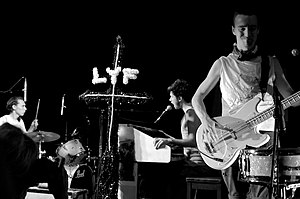Wu Lyf
| WU LYF | |
|---|---|

Midi Festival 2010
|
|
| Background information | |
| Origin | Manchester, England |
| Genres | Indie rock |
| Years active | 2008–2012 |
| Labels | LYF Recordings |
| Associated acts | Los Porcos, LUH. |
| Website |
wulyf worldunite |
| Past members |
|
WU LYF (pronounced "Woo Life", stands for "World Unite Lucifer Youth Foundation") were a band from Manchester, England that originally became known for creating a mystery about themselves by declining requests for interviews and not releasing much information to the press. The band described their music as "heavy pop". Their manager, Warren Bramley, has previously worked with Tony Wilson at Factory Records.
WU LYF formed in the summer of 2008 and consisted of "Jeau" (Joe Manning), "Lung" (Tom McClung), "Elle Jaie" (Ellery Roberts) and "Evnse" (Evans Kati). The band started their own record label titled Ridiculous Records. The band's first gig outside Manchester came in July 2010 at the MIDI Festival on the French Riviera. Subsequent shows include France's Transmusicales Festival, Berlin's Transmediale festival and sold-out headline shows in Glasgow and London. In July 2010 the band announced the formation of the Lucifer Youth Foundation, giving new members an illustrated bandit mask and a 12" single featuring the tracks "Concrete Gold" and "Heavy Pop". The band started recording their debut album in November 2010 using the money generated by the L Y F membership scheme. Deciding against the conventional studio set up, they instead took over Saint Peter's church in Ancoats, Manchester, to record their album. The album is self-produced. The band declined all offers from established record labels and released their debut album, entitled Go Tell Fire to the Mountain, themselves on 13 June 2011 through the L Y F recordings imprint. In support of the record's release, the band played several dates in the UK to critical acclaim, culminating in the curation of the Great Bridgwater Street Tunnel as part of the Manchester International Festival.
The band had the concept for Go Tell Fire to the Mountain long before the recording process took place. Roberts states that it was written "in a narrative sense and [was approached] as a complete work rather than a bunch of songs thrown together." When searching for a place to record, the group was dissatisfied with the sound they were getting from traditional studios, leading them to settle on an old abandoned church in Manchester, England. The amount of open airspace in the church allowed for a healthy dose of reverb, which is a critical part of the album's larger than life sound. Despite the media's insistence of the location's relevance to the religious theme of the band, Roberts denies it. Although the church altered the "vibe of the songs", the band asserts that Saint Peter's church sonically fit the album's needs.
...
Wikipedia
